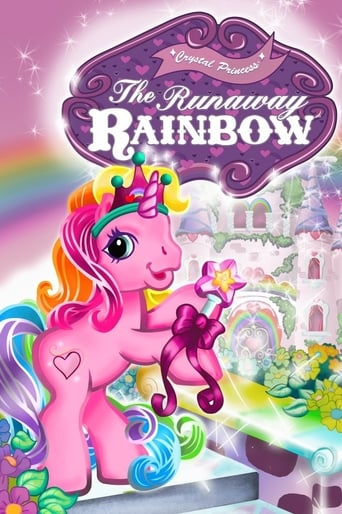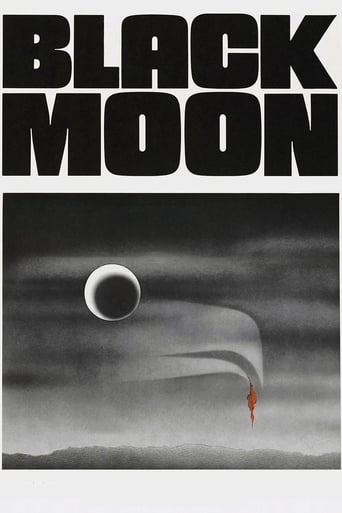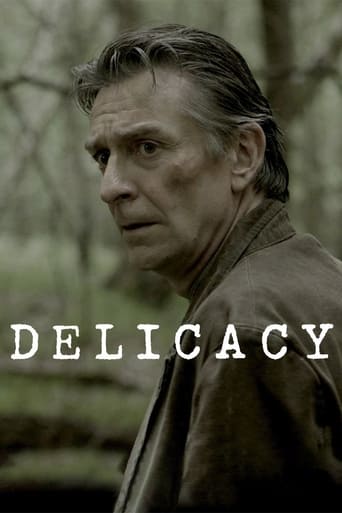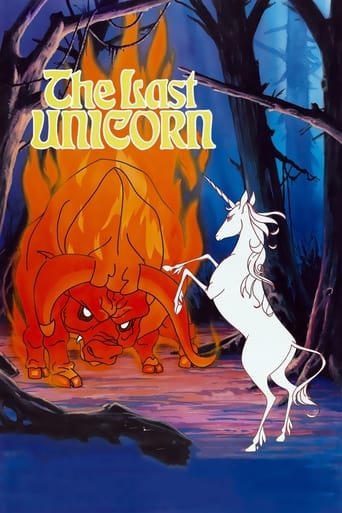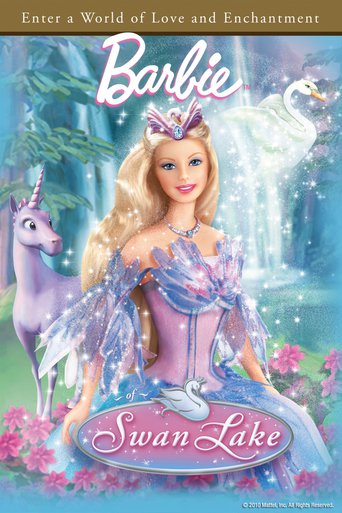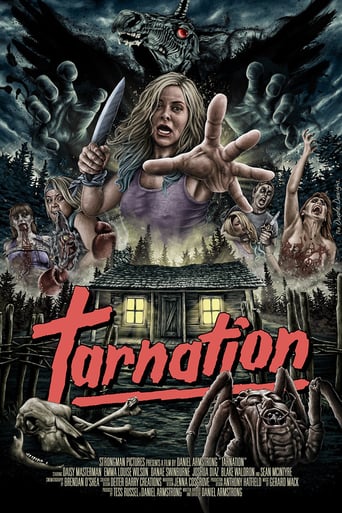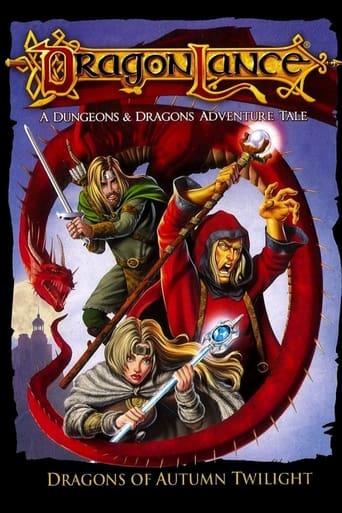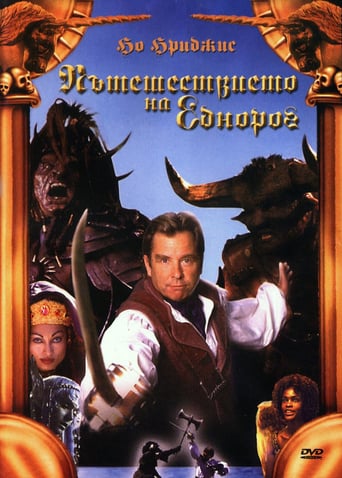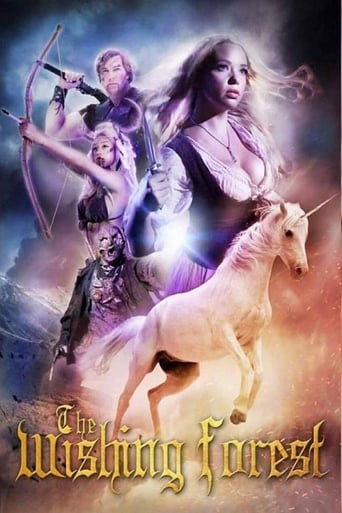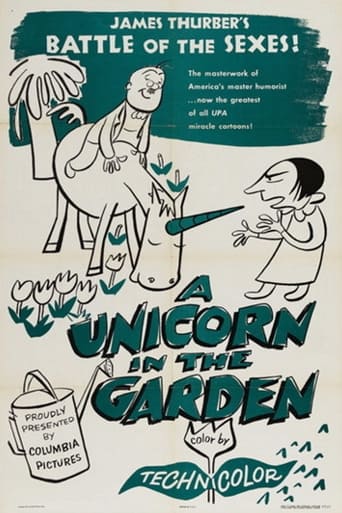
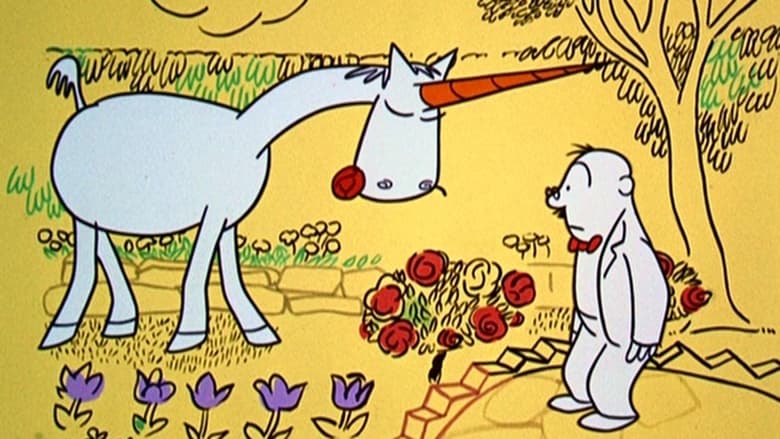
The Unicorn in the Garden (1953)
Based on James Thurber's short-story about a mild, henpecked man who, while preparing his breakfast, looks out the window and sees a unicorn eating flowers in the garden. He rushes upstairs to inform his domineering wife, and she accuses him of being crazy and threatens to have him put away. He persists that he did see a unicorn in the garden, and she phones for the authorities to come take him away. But when they arrive, with strait-jackets, they find the wife rambling and raving about seeing the unicorn, and promptly take her away.
Watch Trailer
Cast


Similar titles
Reviews
Why so much hype?
Blistering performances.
Great example of an old-fashioned, pure-at-heart escapist event movie that doesn't pretend to be anything that it's not and has boat loads of fun being its own ludicrous self.
A clunky actioner with a handful of cool moments.
I found this cartoon on YouTube while I was doing some research on cel-animated dialogues as part of a university assignment. Although everything about this cartoon is simple (the character designs, lip-sync and colour scheme especially), the unicorn is cute and the garden is beautifully designed. The animation is also straightforward yet impressive since it uses basic principles such as exaggeration (when the man's arm stretches to close the blinds), squash and stretch (the woman stretching upwards and the psychiatrist squashing downwards) and staging (in particular the arrangement of the policemen, women and psychiatrist sitting down when the woman reports what her husband saw). I also thought the background music was pleasant and the moral was decent.All in all this is a rare gem that was well worth the search, in spite of its somewhat repetitive dialogue, and reminiscent of classic Aesop's fables. 8/10.
James Thurber's The Unicorn in the Garden, as animated by the artists of UPA Studios, is a wonderfully humorous fable about the glories of imagination and the follies of bitterness. The man here represents the former and his wife, the latter. Whether we are meant to believe the man really saw the unicorn or dreamt the whole thing in order to get his wife committed should probably be up for someone else to consider but it's obvious he wasn't happy for a long time with her around and was very glad when she was sent away. Half of me wondered when the wife talked to the psychiatrist whether the doctor himself had seen a unicorn and wanted to protect himself when the husband made the "mythical creature" remark and not reveal he had indeed seen one before. Of course, all that is hearsay so I'll just say that UPA has made another great animated short that should be a classic forever and ever!
Unlike his close friend and fellow humorist Robert Benchley, James Thurber was never able to become a movie personality and actor. There talents were equally wonderful as writers and humorists, but Benchley (despite some alcoholic problems) was basically photogenic. You look at him in his films and see someone...well who was worthy to both listen to the voice and watch the physical presence. Thurber was handicapped - literally. He was a tall, thin man, who had been injured in his youth accidentally - it resulted in him having worsening and worsening eyesight until he finally went blind before his death in 1961. The American public has tolerated many physical problems, and even once gave a best supporting Oscar to Harold Russell, a genuine war hero and double hand amputee. But it would have been more than it could expect to support a film career for an exceptionable writer that everyone knew could barely see the film set.It is as a creative writer of comedy (THE SECRET LIFE OF WALTER MITTY, THE BATTLE OF THE SEXES, MY WORLD AND WELCOME TO IT, THE WAR BETWEEN MEN AND WOMEN) that Thurber left his mark on screen. And bless 'im for it. But there is much that was never tried because Thurber wrote in so many styles, from plays (THE MALE ANIMAL) to short stories (MITTY), to essays comical ("THE MACBETH MURDER MYSTERY"), to serious historical essays on crime ("A KIND OF GENIUS" - about Willie Stevens, one of the defendants in the Hall - Mill Murder Case). One thing he liked was the old form of the fable, a la Aesop. As he was a cartoonist of great ability as well as writer, his fables frequently were accompanied by the drawings of his imagination of his scenes. When he did a series on the "THE LAST FLOWER" every event is a captioned cartoon.Modern readers of the female sex will not be quite so fond of Thurber as I happen to be - he being male, his views of women are generally hostile (witness Mrs. Mitty, in the short story - a shrewish wife). This is an unfortunate habit of his - like similar habits found in other comic geniuses like W.C.Fields and Laurel & Hardy. Except Fields and Stan & Ollie had some nice women (or understandable ones) occasionally. I have to acknowledge this misogyny as a dark point against Thurber. I can't, off hand, think of a similar female writer with a serious comic grudge against males.One of his best comic fables - in fact the one most people recall - is "THE UNICORN IN THE GARDEN". It is a very clever and unexpected example of the worm turning.A husband has woken up on a week-day before his wife, and is making his breakfast. As he eats the breakfast he looks outside the window at the kitchen nook and sees a unicorn calmly in the garden, munching grass and roses. The amazed husband goes out and looks at the beautiful unicorn (Thurber's drawing is actually simple and lovely) in silence. He gets excited and runs up-stairs to tell his wife. In the cartoon we have already HEARD the wife, angrily wanting to know about the noise she heard (a dropped egg earlier). Now the husband is trying to show his wife the wonderful site of nature or whatever inside their garden. But she is angry or mean, and dismisses the news with a snide, "The unicorn is a mythical beast". It disheartens the husband who goes down to the garden again. This time he feeds the unicorn a lily, and he pats it's horn. He races upstairs again to tell the wife what he has just done. And now she becomes threatening and says, "You are a booby, and I'll have you put in a booby hatch." He angrily replies, "We'll see about that!". The conclusion of the film follows how the wife does try precisely what she threatens. She calls a psychiatrist and the police and requests they bring a straight jacket with them. Then she tells them what the husband said, and how he must be crazy. But by now the actual unicorn is gone, and the husband is just quietly napping under a tree. The wife is considered insane and bundled into the jacket. Her fate is capped off by the husband telling the doctor that everyone knows a unicorn is a mythical beast. As the wife is taken away in protest, the husband smiles at the reader.The moral is given: Don't count your boobies before they are hatched.This cartoon followed the basic drawings of Thurber in the original version, and filled them out quite well. Gently told, and compactly, it is a small marvel of a comic genius of the middle 20th Century.
The failure of AMPAS to nominate this cartoon for an Oscar is unbelievable! Granted, it was a good year for animated shorts and a good year particularly for UPA-Columbia, but this cartoon is simply delightful! Written by James Thurber and animated in Thurber's artistic style, it is his world come to life! If you like James Thurber, you'll love this cartoon, probably as much as I do! Highly recommended.Edit: Since I posted this particular comment, I discovered just why it wasn't nominated for the Academy Award for Animated Short Subject-it was never submitted to AMPAS for consideration, because Stephen Bosustow was, for some reason, not pleased with the end results. I think that it's a marvelous piece of work, but without submission for consideration, the Academy could not nominate the short. I've since watched it several times and it is still highly recommended.


